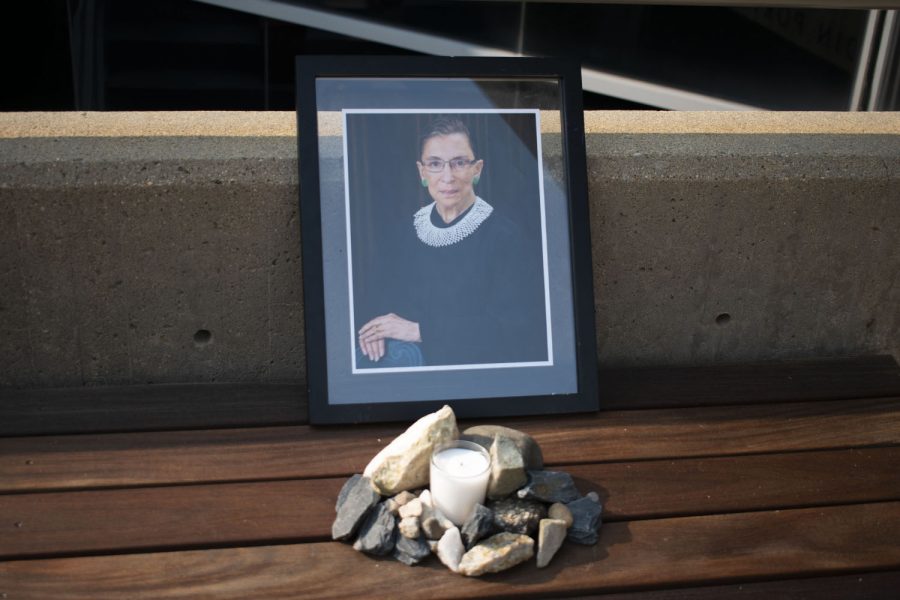Opinion | Women need the opportunity to be leaders
While men have plenty of role models in positions of power to model themselves after, women do not have the same benefit.
A memorial for Ruth Bader Ginsburg is seen outside the University of Iowa’s College of Law building on Monday, Sept. 21, 2020. Ginsburg passed away Friday, Sept. 18, 2020.
October 1, 2020
Within minutes of the death of Justice Ruth Bader Ginsburg, tributes in her honor poured across America. She was a woman that spent her life tackling the barriers and imbalances that rob women of their empowerment and potential at leadership positions. Many women and young girls stared at their screens in mourning and we thought to ourselves, “who will we look up to now?”
Historically, women were forced to comply with society’s set rules and fight tirelessly for representation in society. Sadly, it seems as if women are still fighting to this say. A 2018 Pew survey of U.S adults concluded that the majority of women says there are few women in high political offices. About seven-in-ten women – vs. about half of men – say a major reason why women are underrepresented in top positions in politics and business is that “they have to do more to prove themselves.”
Law was created by men, which makes it harder for women to reach a position of power and be in a place to influence these laws. However, it is those same male leaders that get to decide who becomes endorsed, accepted, or overlooked, and this deprives women of the opportunity to advance equally.
According to a recent IMF study, just 18 percent of firms globally are led by women, and on average, only 22 percent of board members in OECD countries are women. For women of color, representation is even lower with only 4.7 percent of executive- or senior-level officials and managers in S&P 500 companies, according to American Progress research.
Despite the growth of America’s beliefs, large gender gaps in employment, leadership positions, and even income persist. Since 1988, women have outnumbered men on college campuses, and we can see this on our own campus.
In 2019, women made up just over half of student enrolled at the University of Iowa Yet, women are not moving up positions of power and prominence in America. A gulf is widening between the women at the very top of their fields and men who have seemed to be placed there from the very beginning.
First, we need to challenge the status quo and create an environment where all women will be able to reach their potential. First, there needs to be more female professors in more male dominated majors and fields, especially law. Hannah McDonald, former UI student who now attends University of Minnesota, said that her political-science classes had more male students and estimated the share of women at about 30 percent.
The faculty also seems to lack an equal representation and about three in five are male professors. McDonald also expressed her hesitation with going up to the professors and asking them career-related questions since their advice never matched with the reality of being a woman and the work-life balance, which comes more from a male privilege position. At a young age, college women are deprived of a role model that they can look up to and build a connection with.
This leads me to my questions, “who will we look up to now.” Who do we look up when all we see are walls between us and power. The real aim of college should be to create a community that values all individual differences and all colleges should adapt that into their curriculums. If not addressed now, these gender gaps will only continue to grow. Just because society has grown to ignore them for years and disregard them, doesn’t mean that they don’t exist.
We can’t remain in the past. It’s time to build an inclusive future and tackle down the barriers that stand between us and equality.
Columns reflect the opinions of the authors and are not necessarily those of the Editorial Board, The Daily Iowan, or other organizations in which the author may be involved.
















